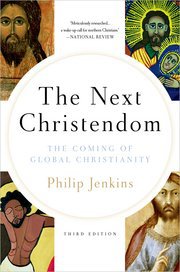 Philip Jenkins is a distinguished religion scholar, currently at Baylor University. His book, The Next Christendom, first published in 2002 was responsible to a significant extent for a new level of awareness of the global church. I well remember Professor David F. Wright urging participants at a conference in the early 2000s to read this book. I responded to his challenge, and found my eyes opened to developments in the global church that, while not entirely unknown, had largely occupied a rather peripheral place in my consciousness. Jenkins’ book changed that for good.
Philip Jenkins is a distinguished religion scholar, currently at Baylor University. His book, The Next Christendom, first published in 2002 was responsible to a significant extent for a new level of awareness of the global church. I well remember Professor David F. Wright urging participants at a conference in the early 2000s to read this book. I responded to his challenge, and found my eyes opened to developments in the global church that, while not entirely unknown, had largely occupied a rather peripheral place in my consciousness. Jenkins’ book changed that for good.
Now available in a thoroughly-revised third edition, and at an excellent price for Kindle (as of 22 February 2017), a striking passage on the opening page is worth quoting (p. 1):
We are currently living through one of the transforming moments in the history of religion worldwide. Over the last five centuries, the story of Christianity has been inextricably bound up with that of Europe and European-derived civilizations overseas, above all in North America. Until recently, the overwhelming majority of Christians have lived in white nations, allowing some to speak of “European Christian” civilization. Conversely, radical writers have seen Christianity as an ideological arm of Western imperialism. Many of us share the stereotype of Christianity as the religion of the West or, to use another popular metaphor, the global North. It is self-evidently the religion of the haves. To adapt the phrase once applied to the increasingly conservative U.S. electorate of the 1970s, the stereotype holds that Christians are un-black, un-poor, and un-young. If that is true, then the growing secularization of the West can mean only that Christianity is in its dying days. Globally, perhaps, the faith of the future will be Islam.
Over the last century, however, the center of gravity in the Christian world has shifted inexorably away from Europe, southward, to Africa and Latin America, and eastward, toward Asia. Today, the largest Christian communities on the planet are to be found in those regions. If we want to visualize a “typical” contemporary Christian, we should think of a woman living in a village in Nigeria, or in a Brazilian favela.
Discover The Next Christendom, and discover the global church!
[Edit 9th March 2017: The Next Christendom is still available at the discounted price, and another book by Philip Jenkins, God’s Continent, is also available at a discounted price for Kindle. Readers outside the UK may have access to further deals on his books.]
Advertisements Share this:




